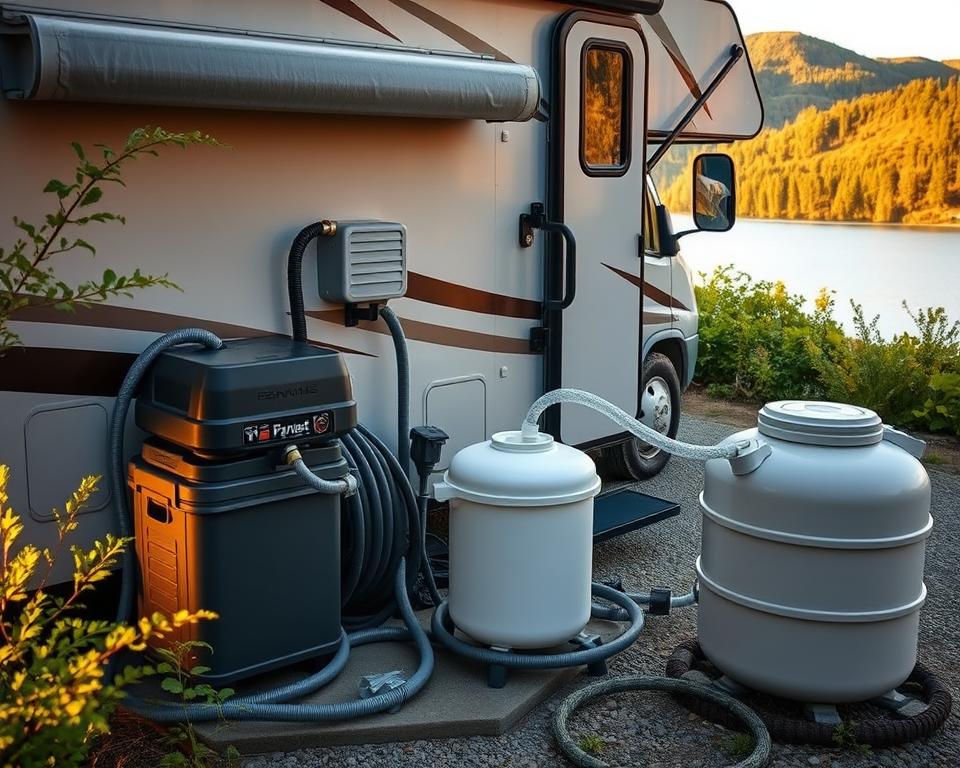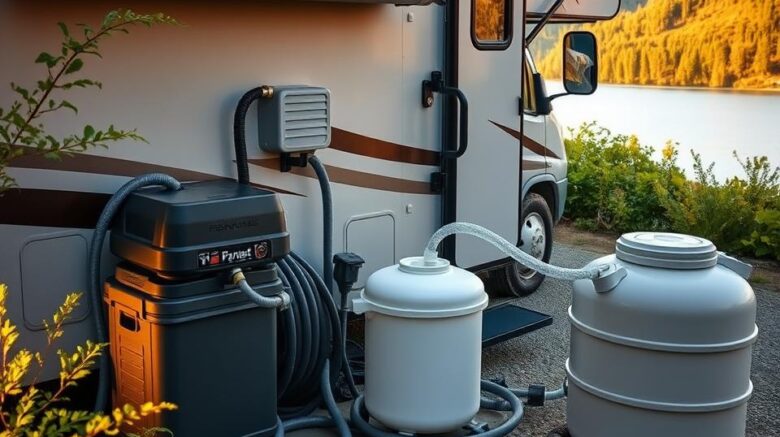RV Black Water Pump: Must-Know Service Tips
Is your RV’s black water pump really road-ready, or might it lead to camping woes? Preserving your motorhome’s waste system in top shape is imperative. It wards off bad smells, clogs, and expensive damage. We’ll share key advice to guarantee your sewage pump works without a hitch, making your travels peaceful.
Comprehending Your RV’s Plumbing System
The RV plumbing system is integral for any pleasant excursion. It separates into two main parts: the black water system and the gray water system – mobile RV septic pumping. The black water system holds waste from the toilet, and the gray water system manages wastewater from sinks and showers.
The systems utilize drain lines that direct toward different tanks, designed for efficient waste management. Each tank has a vent to block gas from building up, keeping the operation is safe and pleasant. Proper waste management in an RV is key to forestall leaks or bad odors. By knowing both black and gray water tanks, RV owners can look after and manage waste better.
Understanding how your RV’s plumbing works helps spot issues in advance. Regular maintenance creates carefree adventures for everyone. Staying ahead with your RV’s plumbing system delivers reliability during your travels.
Kinds of RV Water Tanks
Owning RVs involves knowing the different tanks. Each one is essential to your RV’s function, demanding regular upkeep.
The fresh water tank stores potable water. It’s necessary for a pleasant RV experience.
The gray water tank receives sink, shower, and other non-Septic wastewater. Overseeing this tank keeps your RV clean while traveling. The black water tank, on the other hand, contains toilet waste. It needs regular emptying and meticulous maintenance to avoid issues.
By learning about the fresh, gray, and black water tanks, RV owners can smoothly run their systems. This forethought and continual maintenance ensure smooth functionality of the waste management system.
Black Tank Mechanics
The process of the black water tank is key in RV waste management. It receives waste from the toilet via a gravity-fed system. Upon flushing, waste and water are directed into the tank, to be stored until removal is necessary. It’s critical to keep water levels optimized in the toilet to avoid solid waste buildup.
Knowing how RV waste tanks function can circumvent clogs and odors. Without proper care, solid waste hardens, creating blockages and emptying difficulties. Comprehensive tank flushing techniques are vital to preventing these issues, securing smooth functionality.
Frequent inspection of tank mechanics is advised for RV owners. This includes watching flushing methods and keeping adequate water flow. Knowing these essentials helps with efficient tank maintenance, dodging expensive fixes later.

Vital Maintenance Tips for Your RV Black Water Pump
Doing regular maintenance on your RV’s black water pump is imperative. Begin with choosing RV-safe toilet paper to minimize clogs and improve flow. A complete flush can get rid of waste and cut bad smells. Periodically cleaning the tank helps prevent residue buildup, keeping your RV sanitary and comfortable.
Carry out frequent inspections to check your pump’s condition. Watch for any signs of wear or damage that could reduce its function. Using specialized tank treatments, like those from All in Sanitation, can greatly raise both performance and cleanliness. Sticking to these tips can lengthen your pump’s life and improve your RV’s living conditions.
Opt for RV-Specific Tissue
Keeping your RV’s black water system includes vital steps. One essential tip is using RV-safe toilet paper for clog prevention. This specialized product softens quickly in water, perfect for RV sanitation systems.
RV-safe toilet paper is paramount for tank maintenance. It dissolves fast, avoiding blockages from slow-decomposing materials. This enhances waste disposal efficiency and keeps the plumbing trouble-free.
Select brands labeled as RV-safe when buying toilet paper. These products reduce clog risks and prolong your black water tank‘s lifespan by preventing buildup. Continual use ensures a stress-free camping experience, free from plumbing troubles.
Proper Tank Cleansing
Flushing thoroughly your black water tank is essential for smart waste management in your RV. To assist waste movement, ensure the toilet bowl is adequately filled before flushing. Many RVs are equipped with built-in tank flush systems to make the process more efficient. For RVs without this feature, employing tank rinsers that attach to the sewer outlet offers a reliable alternative.
Correct tank flushing supports waste removal and stops solid accumulations and bad smells. Maintaining this process secures your RV stays pleasant, making your travels more enjoyable. A dedication to regular and complete tank flushing will improve hygiene and the overall condition of your RV’s plumbing system.
Avoid Gunk through Routine Cleansing
Ensuring your RV’s black water tank free of buildup is essential for its efficient function. Regular cleaning eliminates lingering waste inside the tank walls. This means flushing well with water and using specific RV tank cleaners for tough deposits.
By cleaning often, you stop odors and lessen clog risks. A spotless tank makes RVing better and helps your plumbing last longer. Add tank maintenance into your routine to deliver smooth travels.
Selecting Safe Treatments
Opting for appropriate chemicals for RV black water pump maintenance is essential for managing waste and controlling smells. Many RV enthusiasts favor enzyme-based RV holding tank treatments. These products contain good bacteria to break down solids and reduce bad odors.
Avoiding harsh chemicals is important to prevent damage to your plumbing. Such substances can corrode pipes, leading to expensive repairs and diminishing your RV enjoyment. Choosing safe chemicals for odor control ensures your tank and pump’s longevity.
Keeping your RV black water tank in peak form improves your travel experience. Using the right holding tank treatment routinely guarantees your system works well.
Proper Dumping Schedule
It’s essential to empty your RV’s black water tank at the appropriate point for efficient waste removal. Make it a goal to empty when the tank is about two-thirds full is wise. This prevents solid waste buildup, providing a quicker emptying process.
Draining at designated stations is critical for safe, eco-friendly waste handling. It’s important to watch the tank‘s levels closely. Letting it max out can result in clogs and make disposal more difficult.
Proper timing and methods are key for hygienic waste management and can increase your plumbing’s life. Remaining attentive and doing proper upkeep delivers a pleasant RV living experience.
Seal Inspection and Upkeep
Examining seals around the toilet and tank is crucial for leak prevention. Over time, these seals might break down, leading to odors and potential harm. A thorough inspection will show any wear or damage. Detecting issues early permits quick replacement to secure a secure connection and odor-free RV.
Maintaining a bit of water in the toilet bowl supports in preserving seal condition. This preventative measure is critical in RV seal upkeep. It lengthens the seals’ life, stopping leaks and foul odors.
Routine seal maintenance can forestall costly fixes later. By staying mindful of seal health, RV owners deliver a pleasant journey.
Extra Strategies for Ongoing Upkeep
Booking professional servicing for your RV at least once a year is prudent, particularly for black water tank care. This strategy assists with catching trouble fast and upholds your plumbing system’s integrity.
When setting your RV for storage, fully clean and empty the black water tank first. Look into antifreeze to shield against damage from remaining water during cold seasons. Following this practice is critical for preserving the system, ensuring it’s ready for your next adventure.
Steady reviews and preventive actions are essential to extending your sanitation system’s life. Paying close attention to connections, hoses, and seals secures smooth operations. This method enhances your RV experience, making it enjoyable all year round.
Securing your RV’s black water pump is well-maintained is critical for a stress-free camping journey. By adhering to the maintenance tips shared, you can retain your black water system operating flawlessly. It’s essential to focus on consistent tidying, employing correct flushing methods, and choosing appropriate chemicals for waste management.
By fulfilling these maintenance requirements, you will prevent unpleasant odors and blockages. This also prolongs your RV plumbing system’s durability. Proactive care of the RV black water pump yields more time enjoying the outdoors, free from potential setbacks.
Keep in mind, proper upkeep is key next time you gear up for an outing. It’s not the highlight of RV ownership, yet it significantly boosts your travel experience.
